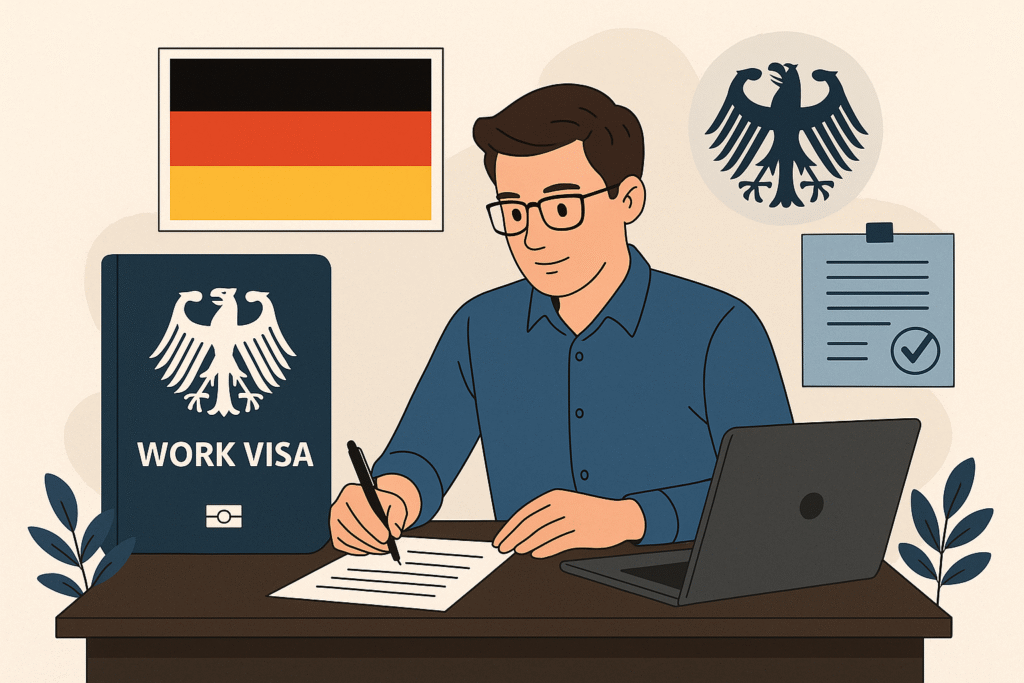
Are you dreaming of working in Germany and building a life in one of Europe’s strongest economies? Whether you’re an experienced professional, a recent graduate, or an IT specialist, navigating the German work visa process might seem overwhelming. But don’t worry—we’ve distilled the essential insights from expert resources and government guidelines so you can take confident, informed steps toward your future.
What Is EtaInfi and Why Should You Start Here?
EtaInfi is your trusted consulting partner for navigating life, work, and relocation in Germany. We specialize in simplifying complex bureaucratic processes and offering creative, strategic guidance for professionals and content creators aiming to build a successful future in Germany. From job searching to visa guidance, we equip you with everything you need to succeed.
Do You Actually Need a Visa to Work in Germany?
If you’re from the EU/EEA, you don’t need a visa. Nationals of countries like the U.S., Canada, Australia, and Japan can enter visa-free but must apply for a residence permit after arrival. All other third-country nationals must secure a visa before entering Germany for work purposes.
How Do You Know Which Visa Fits Your Profile?
To find the right visa, you need to assess four factors:
- Your employment contract (a requirement for most visas)
- Your salary level
- Whether your job is in a regulated profession
- Your qualifications and work experience
What Counts as a Skilled Worker in Germany?
A “skilled worker” in Germany is anyone with either:
- A recognized university degree
- A vocational qualification equivalent to German standards (minimum two years)
Recognition or comparability of your degree is mandatory for most visa types. Use the Anabin database or obtain a ZAB statement to prove your credentials.
Which Work Visas Are Available and What Are Their Requirements?
- EU Blue Card
- For academic professionals with a recognized degree
- Minimum gross annual salary: €48,300 (or €43,800 for shortage occupations, IT specialists, or recent graduates)
- Job must align with your field of study
- Fast-track residency and family reunification benefits
- Work Visa for Qualified Professionals
- For academic or vocational degree holders with full recognition
- No salary threshold unless you’re over 45 (€53,130/year required)
- Jobs need not directly match your degree field (for non-regulated professions)
- Visa for Recognition Partnership
- Begin recognition after arriving in Germany
- Must have a state-recognized degree and job offer
- A2 German level required
- No salary threshold
- Visa for Professionally Experienced Workers
- No full recognition needed, but degree must be state-recognized
- At least 2 years of relevant experience required
- Minimum salary: €43,470 (higher if over 45)
- Valid for non-regulated professions only
What About IT Specialists?
Great news: Germany offers multiple flexible visa routes for IT professionals, even without a formal degree. With enough experience (2-3 years), and meeting salary thresholds, you can qualify for:
- The EU Blue Card
- Work visa for professionals
- Visa for experienced workers
What Should You Know About the Recognition Procedure?
Recognition is vital for most work visa types, especially if you’re in a regulated profession like healthcare or education. Use official databases and verification tools to identify the competent authority. For non-regulated roles, Anabin or a ZAB statement may suffice.
Can You Convert a Tourist Visa Into a Work Visa?
No. You must apply for a work visa from your country of residence. The conversion of a Schengen visa into a work visa within Germany is not permitted.
How Long Does the Process Take?
It varies. Factors include your country, visa type, and application completeness. Expect a few months—potentially up to a year. However, Germany is moving toward digitalization of visa services in 2025, which should streamline processing.
What Are the Next Steps to Begin Your Journey?
- Check your qualification recognition (Anabin or ZAB)
- Secure a job offer
- Choose the correct visa type based on your background
- Prepare your documents and book an embassy appointment
- Apply early and follow up with the embassy if needed
Feeling Lost? You’re Not Alone.
EtaInfi offers tools, resources, and personalized support to help you navigate the complex path to working and living in Germany. Whether you’re seeking a visa, building your career, or launching a personal brand, we guide you every step of the way.
Chancenkarte Check: Opportunity Card (Chancenkarte)
Study Profile Evaluation: FREE PROFILE EVALUATION
Ready to Make Your Move?
Germany offers multiple entry paths for skilled professionals with fair, structured procedures. Start by identifying your strongest visa option and build your application with confidence. Need tailored guidance? EtaInfi is here to support you every step of the way.


